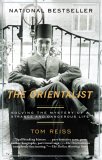Summary | Excerpt | Reading Guide | Reviews | Beyond the Book | Readalikes | Genres & Themes | Author Bio

Critics' Opinion:
Readers' Opinion:
First Published:
Feb 2005, 464 pages
Paperback:
Mar 2006, 480 pages
 Book Reviewed by:
Book Reviewed by:
BookBrowse Review Team
Buy This Book
Just before I left for Baku, an Iranian friend had recommended Kurban Said's novel Ali and Nino as a kind of introduction to the city and the Caucasus in general, saying that it would be more useful than any tourist guide. I had never heard of it, and when I tracked down a 1972 Pocket Books edition, I was a little surprised by the cover. It featured two airbrushed lovers and an endorsement from Life: "If Kurban Said can't push Erich Segal off the bestseller list, nobody can!" But there turned out to be something of the eighteenth century about the book, as if Candide had been written with realistic characters and the intention of sweeping readers off their feet. Each scene continued only long enough to spring some miniature gear that moved the mechanism forward. The reviewer in The New York Times had written, "One feels as if one has dug up buried treasure."
The novel revolves around the love between a Muslim boy and a Christian girl and the progress of their relationship as they grow up; in the culturally tolerant world of old Azerbaijan, their courtship seems blessed, though they are constantly bickering: " 'Ali Khan, you are stupid. Thank God we are in Europe. If we were in Asia they would have made me wear the veil ages ago, and you couldn't see me.' I gave in. Baku's undecided geographical situation allowed me to go on looking into the most beautiful eyes in the world."
Over the course of its history, Azerbaijan had been conquered by Alexander the Great, the Mongols, the Ottomans, and the Persians. Finally, its "undecided geographical situation" was resolved when the Russians captured it in 1825. During the period of czarist expansion in the Caucasus, so vividly recounted by Lermontov, Tolstoy, and Pushkin, Europe discovered Baku and Baku discovered Europe. And everyone discovered oil. Lots of it. In Baku you did not need to drill for the stuff–it sat on the surface of the earth, in black ponds, sometimes enormous lakes–and the flow could be so strong that crude occasionally swallowed whole houses along the Caspian shore. The walled caravan outpost soon became the center of the burgeoning global oil industry–supplying more than half the world's crude–and the result was a fabulous nineteenth-century city built on the profits: extravagant mansions, mosques, casinos, and theaters from the period when the city was home to the Rothschilds, the Nobels, and dozens of local Muslim "oil barons," as they were called. There was Mir Babayev, a popular singer who, after discovering oil on his land, spent the rest of his days searching out his record albums and destroying them because he preferred to be remembered as an oil magnate. And there was Haji Zeynalabdin Taghiyev, who made his fortune when an earthquake struck his land, flooding it with oil; he built the first school for girls in the Muslim world. Building wars sprang up. Moorish palaces still sit next to Gothic manses, and Byzantine cupolas next to bejeweled rococo pavilions. The locals styled themselves cultured Europeans and "modern Muslims," right up to the point when the Bolsheviks decided they were decadent bourgeois and swooped in to crush them.
But Baku oil fueled Stalin's Five Year Plans, and during the Second World War, Hitler wanted Baku's oil so badly that he redirected the entire Russian campaign to get it. In September 1942, his general staff presented him with a giant cake in the shape of the Caucasus. A newsreel of the occasion shows the führer cutting himself the piece with baku spelled out in frosting. "Unless we get the Baku oil, the war is lost," Hitler shouted at a top commander, and he sacrificed the entire German Sixth Army at Stalingrad rather than redirect a single division out of the Caucasus to come to its aid. If they had succeeded in grabbing Baku, the combined Nazi armies would have controlled one of the greatest strategic energy reserves in the world–not to mention one of the most strategic pieces of territory, the land bridge between Europe and Asia–and, with the Soviet Union deprived of its oil, the Nazis would have for all purposes won the war. Instead of victory, the push for Baku brought utter defeat on the Russian front, and less than three years later, Soviet armored divisions, tanked up with Baku oil, were at the gates of Berlin.
Excerpted from The Orientalist by Tom Reiss Copyright © 2005 by Tom Reiss. Excerpted by permission of Random House, a division of Random House, Inc. All rights reserved. No part of this excerpt may be reproduced or reprinted without permission in writing from the publisher.





The Funeral Cryer by Wenyan Lu
Debut novelist Wenyan Lu brings us this witty yet profound story about one woman's midlife reawakening in contemporary rural China.
Your guide toexceptional books
BookBrowse seeks out and recommends the best in contemporary fiction and nonfiction—books that not only engage and entertain but also deepen our understanding of ourselves and the world around us.